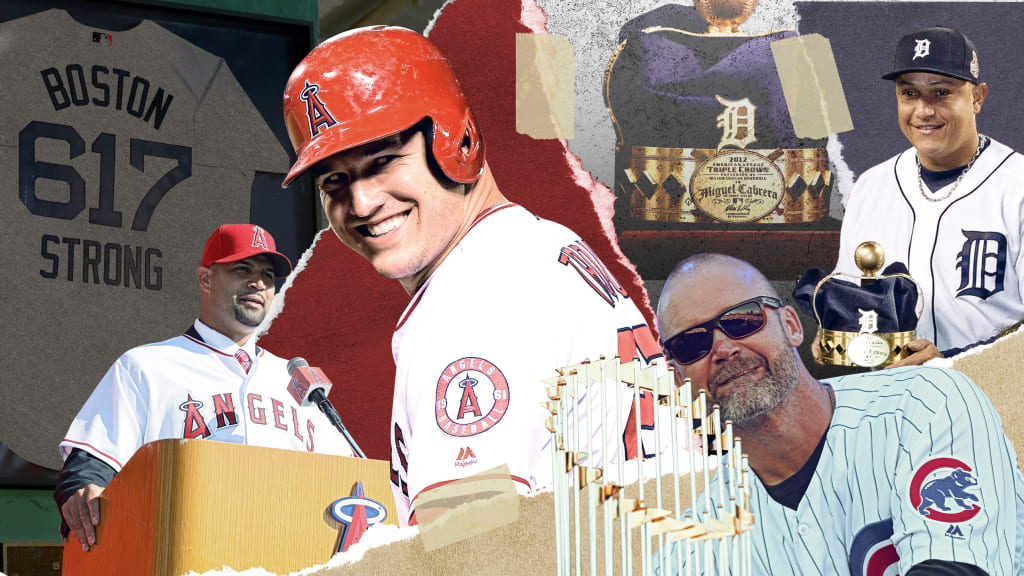
Will Leitch’s series on the Data Decade, closing out this remarkable decade in the year of baseball, runs every week until the end of the year. This is the final installment: A look at the biggest stories of the decade.
What will you remember about this decade? How will this decade live on in history? As the decade comes to a close, here is a look at 11 stories that defined it.
1. The Cubs win the World Series
This would have been the biggest baseball story of last decade, or the decade before, or the decade before that one. But it didn’t happen in any of those, or many decades before that. It happened in this one.
2. Mike Trout arrives
At the age of 27, Babe Ruth and Barry Bonds (the two greatest players in baseball history, according to Baseball Reference’s version of WAR) had put up 50.3 career WAR. Trout, having just finished up his age-27 season, stands at 72.5. JUST SAYING. On Dec. 31, 2009, you might have never heard of Trout. Now we all know we’re watching one of the best players ever to be a part of the sport, right in front of us, every day. It’s a gift.
3. The Giants win three World Series in five years
Remember when the Giants were the star-crossed franchise, the one that hadn’t won a World Series since 1954 when they still played in New York? The one that had never brought a title to San Francisco, the one that couldn’t even get there with Barry freaking Bonds? Well, Madison Bumgarner and Buster Posey arrived (among others) to put an end to all that, helping the club win the title in 2010, ‘12 and ‘14.
The Giants were never a great regular-season team, but they showed how to overcome that fact in the Wild Card age: They got hot in October, and that was all that mattered. And Bumgarner has secured his legend as a postseason all-timer.
4. The Red Sox’s Boston Strong year
The Red Sox won two World Series this decade, and the latter one (in 2018) might have been the best individual team of the last 10 years. But the truly inspirational one was the ‘13 team, one that helped unite a city mourning after the Patriots' Day Boston Marathon bombing. David Ortiz was a leader all season, but never forget how good he was that October: He hit .688 in the World Series against the Cardinals, for crying out loud! The 2004 club that ended the “Curse of the Bambino” will always be the emotional breakthrough for Red Sox fans. But 2013 still makes ‘em cry.
5. Data takes over
The analytics movement that was made famous with the publication of "Moneyball" in 2003 took over the game this decade, as “quants” truly charged the castle. Analytic departments have a major say in pretty much every front office, Statcast and other innovations have altered how we understand the game and players (and organizations) are being valued and assessed in ways they never have before. There was a time when old-time baseball people hated all these computer nerds. Now the computer nerds are the old-time baseball people.
6. The rise and fall and rise and fall of the Astros
Speaking of analytics … did the Astros ever have a busy decade. The 2010 team still had Roy Oswalt, Lance Berkman and Hunter Pence on it. They were losing more than 100 games the year after that, and two years after that they switched from the National League to the American League. They lost a team-record 111 games their first year in the AL in 2013, but then Jeff Luhnow and company began to turn it around.
By 2015 the Astros were in the postseason, and in ‘17, they were winning 100-plus games for the first of three consecutive years … and winning a World Series. But in '19, with perhaps their best team of all, they were rocked by a sign-stealing scandal, the details of which we’re still all trying to figure out.
Oh, and there was a massive hacking scandal with the Cardinals in the middle of there, too. The Astros might not have been the best team of the decade. But they sure were the most interesting one.
7. The Wild Card Game debuts
It seems bizarre now that there was ever a time that we didn’t have either, doesn’t it? The first Wild Card Game, in 2012, was a doozy: It was the infamous Infield Fly Game in Atlanta, where the Cardinals beat the Braves in what turned to be Chipper Jones’ final game. That might still be the best Wild Card Game ever, though 2014 Royals-A’s, 2017 Rockies-Cubs and 2016 Orioles-Blue Jays (where are you, Zack Britton?) could make an argument.
The Wild Card Game changed competitive strategies for whole franchises: It gave you another way to get in the tournament, and the 2014 Giants and 2019 Nationals showed you could win that game and end up winning the World Series.
8. The expansion of instant replay
Instant replay made its debut in 2008, but only on home run calls. It was fully expanded for the '14 season, and we’re still dealing with the ramifications of introducing replay in baseball. There is no denying it’s impact. You can argue that (at least) two teams owe their World Series to instant reply.
- In the third inning Game 7 of the 2014 World Series with the Royals' Eric Hosmer batting and a runner on first, the Giants' Joe Panik made a diving stop on a grounder by Hosmer and flipped to Brandon Crawford who fired to Brandon Belt. Hosmer was originally ruled safe, but the call was overturned by replay. The games was tied at 2, and the Giants would win, 3-2.
- In Game 4 of the 2018 ALCS, with the Astros trailing, 2-0, José Altuve hit a fly ball off the glove of Boston’s Mookie Betts that appeared to be a game-tying two-run homer. But after review, the umps ruled that a Houston fan had interfered and Altuve was ruled out. The Red Sox would win the game, the series and the World Series.
Just imagine if replay had existed in 1996? Jeffrey Maier would be a goat rather than a legend, and perhaps that Yankees dynasty never gets off the ground. Butterfly effect, people!
9. Miguel Cabrera wins the Triple Crown
With the growth of analytics and recognition that batting average and RBIs aren’t necessarily the best evaluation tools, this was probably the first decade in which a player could win a Triple Crown and there’d be a legitimate argument against him winning the AL MVP Award. (And many people will still tell you that Mike Trout deserved the 2012 AL MVP Award over Miggy, as he had 10.5 WAR to Cabrera’s 7.1, according to Baseball Reference.)
But even in age of advanced statistics, we are not going to overlook a Triple Crown. Miggy’s .330 average, 44 homers and 139 homers in 2012 led the AL in all categories, making him the first player since Carl Yastrzemski in 1967 to win the Triple Crown. And you know what’s crazy? He might have been even better in 2013.
10. The Yankees don’t make a World Series
In 2009, the Yankees won their first World Series in nine years, a span that seemed almost infinite for their fans. But they didn’t know was about to hit them. Despite winning more games than any other team in the decade, the Yanks didn’t reach a single Fall Classic in a decade for the first time since the 1910s. That seems impossible, doesn’t it? Then again: It is the most Yankees thing ever to miss a World Series for a decade and still win more games than everybody else. (The Yanks also won the most games of any team in the 1980s without winning a World Series, though they did appear in the 1981 Fall Classic.)
In case you were wondering how the Yankees react when they go a full decade without making a World Series … they sign the best pitcher in baseball to one of the biggest contracts in the history of the sport.
11. Albert Pujols signs with the Angels
Once Barry Bonds retired, Albert Pujols ascended to his rightful spot as the best player in baseball, but his free agency loomed after the 2011 season, so much so that the Cardinals reconstructed their entire organization (bringing in, among others, Jeff Luhnow, who would revolutionize the Astros a few years later) to make sure they kept Pujols a Cardinals forever. He was El Hombre, the new Stan the Man.
Just a month after the most exciting possible World Series victory, though, Pujols signed with the Angels, where he had a few good years before his production fell apart considerably. Not keeping Pujols turned out to be a good move for the Cards -- they’ve played in 42 postseason games since he left; Pujols has played in three -- but it still, eight years later, is shocking somehow that he didn’t remain a lifelong Cardinal. His return to St. Louis with the Halos last year might have been his biggest highlight as an Angel.
